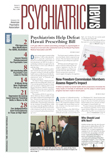High blood pressure may—or may not—increase risk of Alzheimer's disease, depending on who asks the question, and treating high blood pressure may—or may not—reduce that risk, depending on which drugs are used.
Hypertension has been closely linked with vascular dementia and cognitive decline. Some studies have found that taking medicine to lower blood pressure reduces incidence of Alzheimer's disease, while others have found just the opposite.
Most trials of antihypertensive drugs have indeed found that persons with high blood pressure test poorly for mental acuity, said hypertension expert Marvin Moser, M.D., a clinical professor of medicine at Yale and editor in chief of the Journal of Clinical Hypertension, in an interview.“ However, the relationship to Alzheimer's disease is very questionable.”
Nevertheless, a three-year study of 3,217 elderly residents of Cache County, Utah, initially found that use of any antihypertensive medication at baseline was associated with lower incidence of Alzheimer's disease. However, it was later found that the advantage came only from potassium-sparing diuretics and not other antihypertensive medications. The study was published in the March 13 issue of Archives of Neurology.
Use of antihypertensive medications was also linked to increased mortality—possibly because those who took these medications were sicker than those who didn't—although there was no increase in mortality for those taking potassium-sparing diuretics.
Beginning in 1995, the investigators took DNA samples and interviewed the participants about risk and protective factors for dementia. They also completed a more extensive examination of an age-, sex-, and APOE genotype-weighted and stratified subsample of the group. Three years later they re-examined the participants to discover any incident cases of dementia.
At each of the two stages of the study, the researchers asked about antihypertensive medications and cross-checked that information by inspecting medication vials. Antihypertensives were grouped into ACE inhibitors (used by 13.0 percent of the participants), beta blockers (11.5 percent), calcium channel blockers (14.9 percent), and diuretics (26.5 percent). Demographically, antihypertensive drug users were somewhat older and less educated and more likely to be female and have a history of stroke, high cholesterol, diabetes, or heart attack.
Medication use was generally not associated with reduced risk of Alzheimer's disease with the exception of potassium-sparing diuretics. Use of these drugs by themselves produced an adjusted hazard ratio of 0.09. Since many persons with high blood pressure take more than one drug (18.2 percent in this study), the adjusted hazard ratio for all users of potassium-sparing diuretics was 0.26.
Potassium-sparing diuretics, like triamterene, spironolactone, and amiloride hydrochloride, maintain levels of the element in the bloodstream, unlike loop or thiazide diuretics.
Just how this class of drugs may cut the risk of Alzheimer's is not known. The authors noted that published reports suggest that low plasma potassium concentrations are variously associated with oxidative stress, inflammation, platelet aggression, and vasoconstriction, all of which can be linked to Alzheimer's disease pathogenesis. The blood pressure lowering action of the medications apparently did not play a role in the results.
“There was variability in blood pressure by the type of antihypertensive medication being taken,” said study co-author Peter P. Zandi, Ph.D., an assistant professor in the Department of Mental Health at the Johns Hopkins Bloomberg School of Public Health in Baltimore. “But we statistically controlled for current blood pressure in a subgroup of participants on which we had direct measures of blood pressure, and the results did not materially change, so the protective effect of these antihypertensive medications may be independent of their ability to control blood pressure.”
A separate study published recently found that low serum potassium levels in women aged 46 to 60 were associated with low levels of amyloid-beta 42 in cerebrospinal fluid 24 years later. Other researchers have suggested that low cerebrospinal levels of amyloid-beta 42 corresponds to greater presence of the protein locked up in the brain in the form of the beta-amyloid plaques that characterize Alzheimer's disease.
Still, Moser finds the Cache County study's results a bit puzzling.“ If the protective effect is caused by higher potassium levels, why don't we see the same effect in persons [in the study] who were taking angiotensin-converting enzyme inhibitors?” he said in an interview. ACE inhibitors also maintain potassium levels in the body and so should have a similar effect, he said.
Zandi agreed that numerous questions remain. “Further study to clarify whether and how potassium-sparing diuretics may actually provide protection is clearly needed.”
